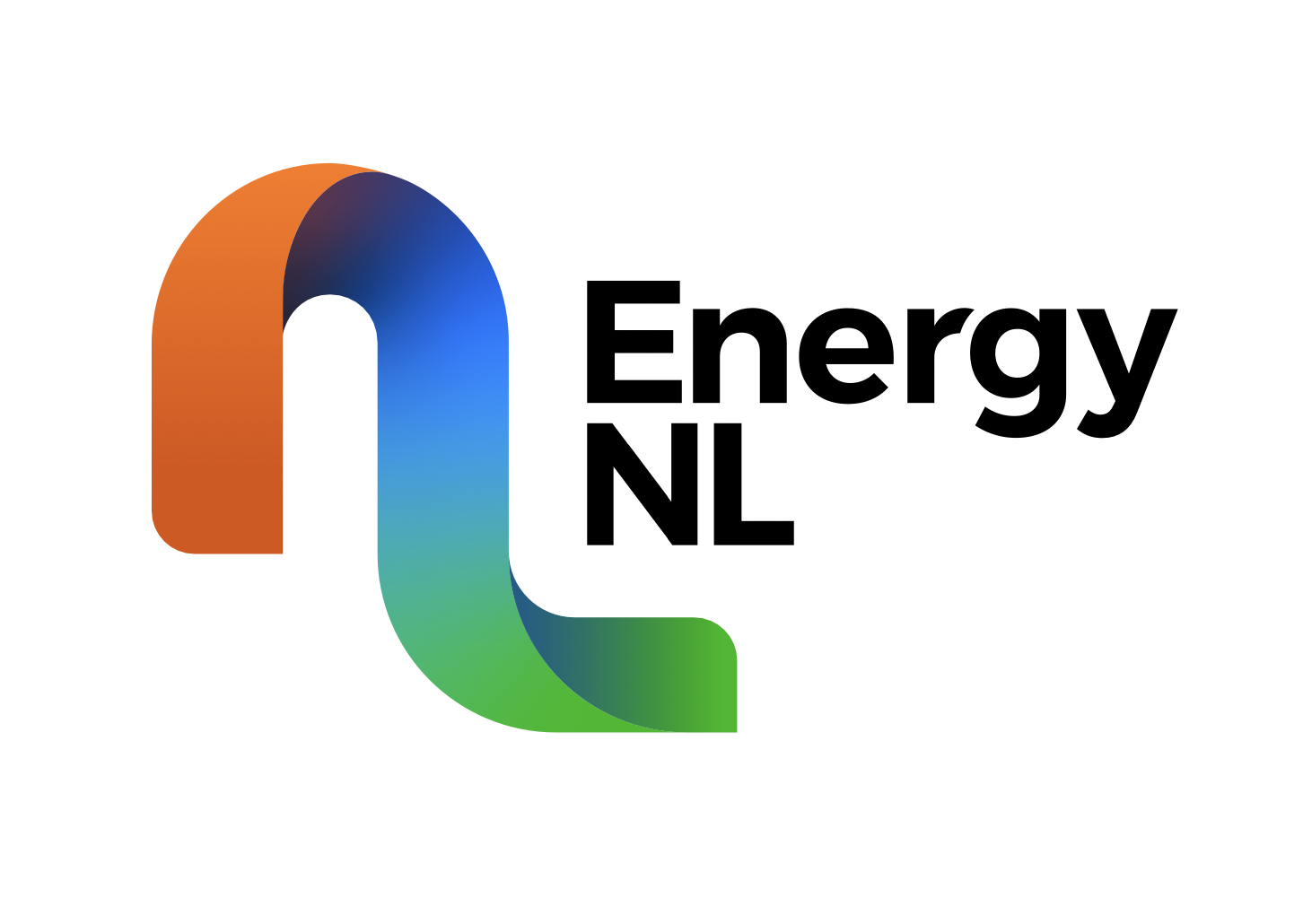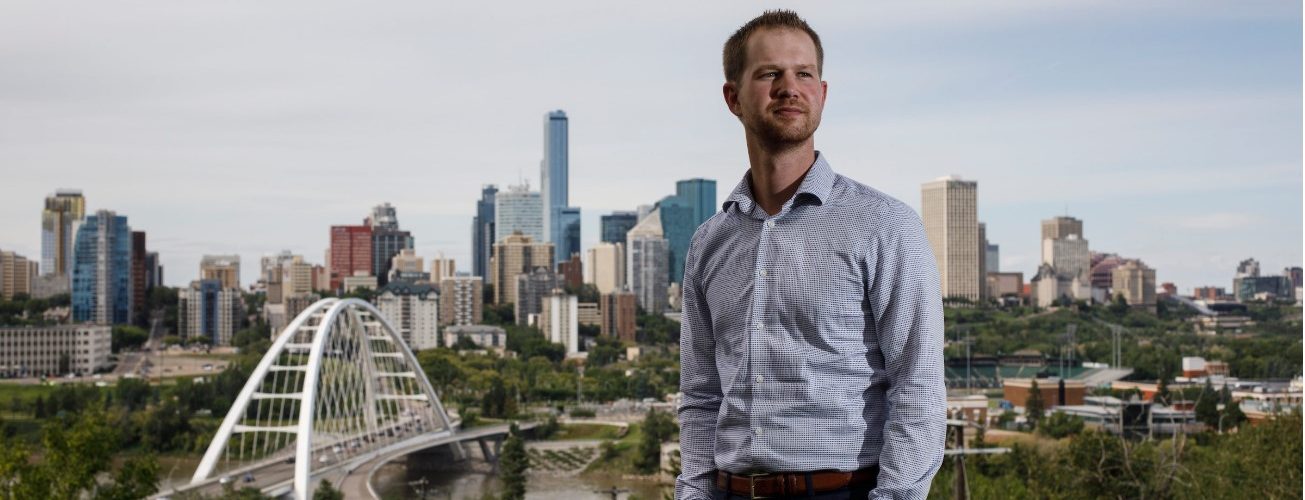Skye Lybbert pictured in Edmonton Alta, on Thursday June 25, 2020. Photograph for Canadian Energy Centre
Growing up in Alberta, 30-year-old Skye Lybbert has always enjoyed being out in the mountains, curious about understanding the rocks and earth beneath his feet and problem solving.
Internships during Lybbert’s undergraduate degree in geology at Edmonton’s University of Alberta gave him his first exposure to the province’s oil and gas industry. He says he “had some stereotypes before going in” about environmental impacts, but learned that this is actually an area of diligent responsibility.
“After working for industry, it’s just like, wow, they really do care for the environment. They really do understand the risks and they take that very seriously,” he says.
“I have a huge appreciation for the environment; I love the environment. I think we need to be responsible and sustainable, and I know that with our Canadian energy industry we are able to achieve that.”
Lybbert is now a Masters of Science in Geology candidate at the U of A. Like many of his friends, including fellow MSc geology candidate and backpacking enthusiast Daniel Baker, he has become frustrated with the misinformation and lack of balance in conversations about energy and climate goals in this country. Baker says they are basically seeing two sides of the camp.
“One wants nothing to do with oil and gas and they want it out of Canada, and it’s kind of sad because of how many people actually rely on these jobs, and that energy companies actually have been working for a while to become the cleanest oil producers in the world,” he says.
“The other side of the camp is like no, nothing’s wrong, there’s no global warming and everything’s fine — we can just drill, drill, drill, drill, drill.
“What we want to suggest is that no, you can have both. You can produce oil and gas and showcase that while producing oil and gas, you can reduce your environmental footprint and provide global energy.”
Frustration over polarization
Their frustration came to a head in June when a letter co-signed by academics including from the U of A was sent to Prime Minister Justin Trudeau asking the federal government not to provide relief to struggling oil and gas companies during the COVID crisis.
Lybbert and Baker say that letter included misinformation and unfairly singled out a sector that Canadians should be proud of. They decided to do something about it, with support from Students for Canada, a non-partisan, student-run volunteer group.
In mid-June they wrote their own letter to Trudeau calling for a more “optimistic viewpoint” that recognizes the benefits and opportunities of oil and gas development. This includes keeping talent in Canada to expand energy horizons, supporting renewable energy, having a global impact on reducing greenhouse gas emissions, and enabling Indigenous communities to reap the benefits of their land and employment in the resource sector.
They point to forecasts that demand for oil and gas will increase by nine per cent by 2040, that Canadian oil and gas development is among the most responsible energy sectors in the world, and that a large majority of Canadians (82 per cent of those polled, according to Abacus Data) support the federal government assisting the oil and gas industry through to the other side of the pandemic.
Lybbert and Baker’s letter has been signed by more than 2700 academics, students, researchers and professionals from across Canada representing a spectrum of disciplines, from earth science and engineering to climate change adaptation and renewable energy to health, economics, sociology and education.
“There are students that realize the need for our resources since it makes a significant contribution for our revenue. It really affects everyone,” Lybbert says.
Leading in technology and innovation
Key to Baker and Lybbert’s arguments for supporting Canadian oil and gas is the sector’s commitment and track record in innovation and performance improvement.
The importance of this has only become more clear during the COVID crisis, Lybbert says, citing recent reports that even if the unprecedented lockdown of human activity were to continue, it would not reduce GHG emissions enough to meet climate targets.
“I found that was pretty interesting, like even a pandemic that literally shut down the globe still wasn’t sufficient to meet those targets, and so it’s through advancements in technology and green tech innovation through our oil and gas sector, is the route to go.”
Lybbert says he experienced first-hand during his internships the industry’s approach to innovation.
“It’s challenging. A problem comes up and there’s times where the company has sat us summer students down and we’ve just come up with some of the craziest ideas, like just thinking out of the box and being innovative, and that’s what I love about it. They’re looking for new ideas, fresh ideas, and just game-changing ideas.”
He says an example at a much larger scale is the NRG COSIA Carbon XPRIZE, a $20-million multi-year international competition launched by Canada’s Oil Sands Innovation Alliance and US-based NRG Energy.
“The whole purpose of this competition is to create breakthrough technologies to convert CO2 emissions into everyday usable products,” Lybbert says.
“People who are in the oil sands, they saw a problem and they’ve been asking on a global scale to come up with solutions, which is pretty sweet, and this is all Canadian-driven.”
A positive future for careers
Responsible development means more innovative technology, which should offer a positive outlook for careers in Canadian energy, Baker says.
“If you have the technology and the expertise that Canada has with engineers, geoscientists, business [leaders] and just other mindsets across the board, we can keep producing responsible energy. We might not be producing it the exact same way as we were 20 years ago or 30 years ago, but we’ll still be producing energy and I really believe that it’s a good thing for a career within Canada.”
About the Canadian Energy Centre (CEC)
The Canadian Energy Centre (CEC) is an independent provincial corporation that is primarily supported by the Government of Alberta’s industry-funded Technology, Innovation and Emissions Reduction (TIER) fund. The CEC’s mandate is to promote Canada as the supplier of choice for the world’s growing demand for responsibly produced energy. At its core, the CEC will also create a new, pragmatic, fact-based narrative about Canadian energy.
—
Source: EnergyNow | This text was excerpted from the media outlet cited on July 15, 2020 and is provided to Noia members for information purposes only. Any opinion expressed therein is neither attributable to nor endorsed by Noia.






